Despite extensive cultural, technological and educational changes, the value of reading remains unchallenged and unchallengeable. Reading accurately, fluently and expressively, is an essential starting point for learning. The process of reading, however, is much greater than transference of symbol to sound, and its purpose far richer than the ability to retrieve information or make deductions, essential though these skills are.
For Emily Dickinson’s ‘dead’ words to come alive requires a personal response from each listener or reader. To read well is to go beyond the sound and meaning of the words and to respond to texts intelligently – both intellectually and emotionally – and as a result grow in maturity.
If the purpose of reading literature is to develop both mind and soul, texts read in school must be chosen with utmost care and purpose. English teachers at St Faith’s consider closely whether the quality and sophistication of a text are likely to promote the fullest intellectual and emotional responses, and maximise opportunity to develop each individual pupil’s own use of language. Literature with an appropriate level of challenge is chosen, because maximum learning takes place when there is just the right amount of intellectual stretch for the individual pupil or class.
Reading material which is just within grasp if pupils are at full stretch is intellectually exhilarating: when texts are pitched with an appropriate level of ambition, pupils can become utterly engrossed in a novel, or passionate in their exploration of a newfound poem.
Variety is essential: St Faith’s pupils read great literature that spans the centuries and the continents, written in English or read in translation, written by men and written by women. They read humour and nonsense, satire and speeches, miniatures and masterpieces, poetry, prose and plays.
Reading well develops intelligence by fostering critical thinking skills. In reading Macbeth, year 7 pupils at St Faith’s grapple with ideas of ambition, greed, power, truth and justice. They question, debate and reason together, drawing on fictional episodes to support their assertions. They also learn the value of a ‘play’ – that these great themes can be ‘played out’ and explored in the sphere of the imagination.
Reading well develops intelligence by fostering critical thinking skills
In the same year, pupils read Coleridge’s The Rime of the Ancient Mariner, developing insight into responsibility, the consequences of actions and our relationships with fellow humans and the natural world. Literature is a place of experiment, where great and small actions and events, and resultant profound consequences and soaring emotions, can be experienced vicariously, safely, but nonetheless vividly.
As a result, reading also fosters empathy. Denise Levertov’s Settling or Fleur Adcock’s Immigrant encourage pupils to think about rootedness and alienation; Heaney’s poetry similarly fosters consideration and empathy for those who feel torn between their heritage and their future.
Reading such poetry, pupils develop a sense of awe at the impact of language, and the devastating – or exhilarating – power of the word. At St Faith’s, responses to such rich literature seem almost effortlessly to foster a rich creativity. Pupils’ writing is often lifted to a new level: the heart-rending diary of a chimney sweep after reading Blake; glittering description in imagined pages of Watson’s notebook while reading The Hound of the Baskervilles; or riotously witty character studies based on The Importance of Being Earnest.
Reading good literature undoubtedly feeds the imagination and fosters in the next generation a creative ability to use language confidently, with clarity, precision and impact. As a gateway to broader intellectual maturity, reading needs to be taught purposefully and passionately. We learn to read in order to make better sense of ourselves, our neighbours and our world. We learn to read in order to imagine, create and express more freely and more fully. What children read at school therefore matters enormously as we seek to ensure that children ‘move strongly, confidently and happily forward, intellectually curious, morally and spiritually aware, thoughtfully tolerant, and aesthetically sensitive’ (St Faith’s Curriculum Policy).
Thus we trust that our pupils will be of great benefit to society in due time, wherever in the global community they find themselves.

